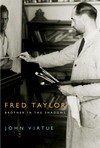
Fred Taylor: Brother In The Shadows
John Virtue
McGill-Queen's University Press
$39.95
cloth
312pp
978-0-7735-33592
The subtitle, Brother in the Shadows, refers to how Fred, as a displaced artist and second-class son (his elder brother E.P. was the favoured family go-getter), was profoundly inhibited and oppressed by a status he could not believe in, achieve, or live without. His brother called him a “freak.” At the height of E.P.’s (nicknamed Excess Profits) fame as a successful capitalist, he was embarrassed by his brother’s gadfly adherence to communism. And here the reader may glimpse the ugly vein of truth that runs through Fred’s story.
When one hears illustrious family names such as Southam, Molson, Seagram, Taylor, and Bronfman, one should remember that social position often stands above everything-very often above the well-being of the offspring. The ‘reality principle’-which one would hope the goal of wealth is to keep at bay-breathes a frosty current into these homes, cooling parental love whenever a child deviates from the narrow path to economic heaven. It is the mean-spirited hold on wealth by the self-proclaimed genetic strongmen that maintains, under the cloak of democracy, a feudal mode of relationships-the entire system supported by the craven respect that the have-nots express for the haves. And so a bastard lineage begins. As E.P.’s son Charles said to his uncle Fred about his father, “His look at me is never direct and open, but sideways and tentative and defensive, by which he acknowledges that he’s never really sired me.” An interesting choice of words for the son of the famous horse-breeder, whose Northern Dancer won the Kentucky Derby in 1964. And Fred’s son Paul said, “Ours was a family in which there was no demonstrable love…It scarred us all.” The misfits, in compensation, become over-achievers and/or grudgingly subsidized failures in their own right. Fred was both.
Biography, as an adjunct of conventional histories, is a genre that presents the facts of a life primarily through names-of families, schools, marriages, cities, friends. Here one can appreciate the amount of spadework required to unearth the facts, the 93 people interviewed, the vast number of letters consulted. But Virtue’s work is lean on interpretation: it fails to overstep the subject and look at the nexus of forces that created Taylor. If a study does not complexify the self, as the best of contemporary fiction, philosophy, and psychology attempt, then it becomes a subset of those histories that manipulate time’s exoskeleton, prolifically dispensing facts which function as shields to block out insight and the evanescent shimmer of lived experience. Of course, attempting to evoke these intangibles is like trying to remove the veil of Isis. As Nobel laureate Kertesz expressed it: “Why wasn’t I able to get back what preceded these phrases…the real morning in Auschwitz? Why did these phrases only capture…an imaginary Auschwitz and a fourteen-year old semi-imaginary boy-although I myself had been that boy?” mRb






0 Comments